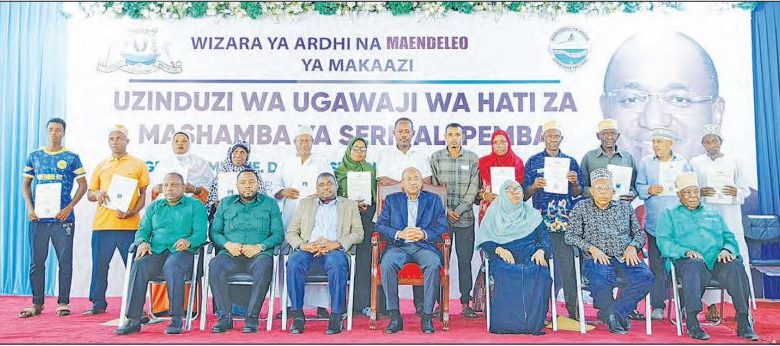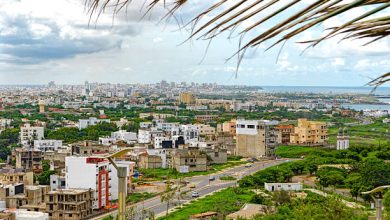How Zanzibar’s clove farmers will benefit from land ownership

ZANZIBAR: ZANZIBAR’S clove industry, once the pride of the islands and the backbone of its economy, is poised for a major revival.
In a landmark decision, last month, President Dr Hussein Ali Mwinyi announced that the government will issue legal land titles to clove farmers, giving them full ownership and control over their farms for the first time in decades.
Speaking during a handover ceremony for government clove plantations in South Pemba, held at the Umoja ni Nguvu Hall, President Mwinyi said the move aims to empower farmers to manage, maintain and expand their farms, ensuring higher yields and long-term prosperity.
“The issuance of land titles will allow farmers and their future generations to legally inherit, care for and replant their clove farms,” Dr Mwinyi explained.
“They will be able to irrigate and manage them better to increase productivity and reap greater benefits from this vital crop for both the national economy and their livelihoods.”
Clove production in Zanzibar has been steadily declining over the years.
According to President Mwinyi, annual output has dropped to between 8,000 and 10,000 tonnes, far below potential.
In comparison, Indonesia produces over 100,000 tonnes annually.
“The question we must ask ourselves,” he said, “is why, despite having the best quality cloves in the world, Zanzibar has failed to reach even 10,000 tonnes a year.”
He pointed to outdated farming methods and a lack of ownership as key challenges.
Because most clove farms were government-owned, farmers often lacked motivation to invest in their maintenance.
“Many times, during harvest season, farmers would be told that their farm had been leased to someone else,” Mwinyi said.
“This discouraged them from caring for the trees properly.”
Under the new initiative, farmers who receive land titles will have full legal rights to cultivate and develop their farms.
The government hopes that ownership will inspire greater commitment and enable farmers to plan longterm.
The Zanzibar Land Commission has already begun verifying farm boundaries and issuing the first 21 titles in South Pemba.
The goal is to complete the process for over 8,200 clove farms across Pemba Island. Land Commissioner Mussa Kombo Bakar said the exercise is designed to reduce land conflicts and strengthen farmers’ authority.
“The titles will give farmers confidence and legal standing to manage their farms,” he said.
“For years, the absence of documentation made it difficult to resolve disputes or secure investment.”
The Commission has worked closely with the Waqf and Trust Commission to ensure that land belonging to families or inherited estates is properly identified and protected.
“We are determined that no rightful owner will be deprived of their land,” Bakar added.
ALSO READ: ZSTC pays 38bn/- to clove farmers in Zanzibar
The government is also addressing other barriers to clove production.
Through the Zanzibar State Trading Corporation (ZSTC), it is distributing high-quality seedlings free of charge to farmers.
This is meant to replace aging trees and ensure sustainable replanting.
“We have every reason to empower our farmers with irrigation facilities,” Dr Mwinyi said. “We can no longer rely solely on rainfall.”
Extension officers, known locally as mabwana shamba and mabibi shamba, will play a key role in training farmers in modern cultivation techniques, from planting to harvesting.
The government, through the People’s Economic Empowerment Agency, will also offer interestfree loans to farmers.
“These loans will enable farmers to maintain and expand their clove farms,” President Mwinyi said.
“If we succeed, production will rise significantly, boosting the national economy and helping farmers lift themselves out of poverty.”
Zanzibar’s cloves are prized worldwide for their superior aroma and oil content.
Yet many farmers have complained in the past about low prices.
To address this, the government has set a policy that guarantees farmers 80 per cent of the global selling price. “Let me assure you,”
Dr Mwinyi said, “if the world market price is ten dollars, the farmer receives eight. The remaining two dollars go toward operational costs such as packaging, transport and administration.”
He cautioned farmers not to be misled by those calling for a liberalised market.
“In a free market system, traders might unite to drive prices down. The 80 per cent policy ensures stability and fairness for our farmers,” he emphasised.
The government has pledged to maintain this pricing structure to ensure that farmers continue to benefit directly from Zanzibar’s export earnings.
The two ceremonies, in different locations in Pemba was described as a historic milestone in Zanzibar’s agricultural reform.
Regional Commissioner Rashid Hadid Rashid called it “a clear sign of development and the government’s determination to empower citizens to legally own their land and assets.”
He praised President Mwinyi’s leadership, noting that the decision has restored trust between citizens and the government.
“This is a living example of his slogan, ‘Yajayo ni Neema Tupu’ (The future is full of blessings),’” Rashid said.
Minister of Land and Housing Development, Ms Rahma Kassim Ali reaffirmed that the government’s intention is transparent and just.
“No one will be wronged,” she said.
“We only ask for honesty and cooperation from the farmers.”
The initiative also recalls the legacy of Zanzibar’s founding president, the late Abeid Amani Karume, who after the 1964 Revolution redistributed land to the people.
Northern Pemba Regional Commissioner Salama Mbarouk said that the current reforms honour that spirit.
“What President Mwinyi is doing is a continuation of the Revolution’s goals, restoring dignity and economic strength to ordinary citizens,” she said.
For local farmer Zainab Juma Abrahman, the new titles mean security and hope.
“Before, we would plant and care for the trees, but we never knew if we would harvest,” she said.
“Now, with our own titles, we can plan, invest and know the benefits will be ours.”
As Zanzibar seeks to revive its once-flourishing clove industry, ownership and empowerment may prove to be the missing ingredients.
The government’s plan to combine land security, modern farming support and fair pricing could help restore the islands’ reputation as the “Spice Isles” of the Indian Ocean and ensure that the aroma of Zanzibar’s cloves continues to reach markets around the world.





